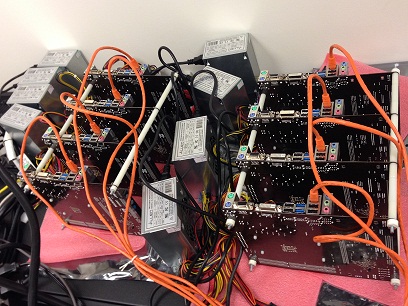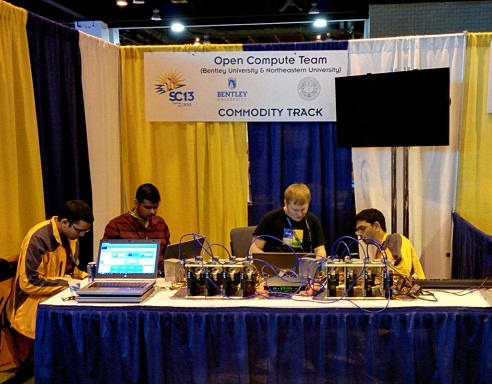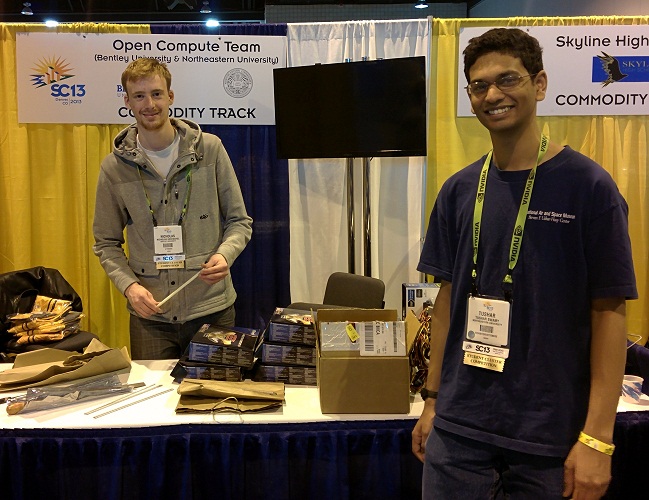
A team of undergraduate students from Bentley University and Northeastern University took first place in a competition against seriously tech-savvy contenders from across the U.S. at the Supercomputing Conference in Colorado. A combination of technical skills and business acumen proved critical as the students ran high-performance computing applications on a supercomputer in a 48-hour marathon event and won the Commodity Track of the conference’s Student Cluster Competition. The student-designed cluster was powered by AMD's A-Series Accelerated Processing Units (APUs). The win clinched a coveted seat at the International Supercomputing Conference in Germany in June 2014.
The team included Bentley seniors Conner Charlebois, Nicholas Hentschel (Computer Information Systems majors) and Dmitry Veber (Actuarial Science major), and Northeastern juniors Neel Shah and Tushar Swamy. Advisers were Irv Englander, professor emeritus (Bentley), David Yates, associate professor of computer information systems (Bentley); David Kaeli, professor of electrical and computer engineering (Northeastern), and PhD candidate Yash Ukidave (Northeastern).

“As business students, we had an advantage in the planning and building phase of the competition because we were able to think critically about what we were willing to give up and what we needed to hold on to, in terms of hardware,” Charlebois notes. “It was really a cost-benefit analysis design exercise.”
The Bentley-Northeastern cluster computer was assembled for less than $2,500, and ran four applications while consuming less than 15 Amps of current, beating several teams with unlimited budgets. The students picked the AMD A10 family of APUs for their performance per dollar. AMD’s system on a chip (SOC) design also gave the team a symmetrical cluster design within this chip family, with x86 double-precision floating point performance being most important over the course of the 48-hour competition.
“The Bentley-Northeastern student team differentiated themselves by infusing an open compute design philosophy with state-of-the art technology developed for the gaming market,” explains Yates.
Both Yates and Englander agree that while high-level technical skills are critical to building supercomputers, project and time management and communication skills positioned the Bentley-Northeastern team to win the contest. Yates observes, “Given that an interview question-and-answer session was 20 percent of their final score, our business students certainly had an edge over the competition as they are quite well-trained in the art and science of interpersonal communication.”
“Part of their success came from an entrepreneurial spirit that drove our team to find out what they needed, reach out and go beyond traditional channels to get help,” Englander adds. “The business mindset is that when you need to solve a problem, you work as a team to find a solution.”
The approach proved crucial on the competition floor, according to Charlebois, as the team effectively delegated tasks and operated as a cohesive unit. “With just 48 hours and massive data sets, we realized that we wouldn’t be able to get through all of them. We actually decided which applications to run based on an economic model. We calculated which problems would earn our team the most points in the least time and focused on those problems with the best return on investment.”
Charlebois, Hentschel and Veber are tutors in Bentley’s CIS Sandbox, a collaborative space for students to explore and learn new technologies. Earlier this year, Charlebois and Hentschel co-wrote a paper with Bentley CIS senior lecturer Mark Frydenberg that received a meritorious paper award at the Information Systems Education Conference (ISECON). “Swipe In, Tap Out: Advancing Entrepreneurship in the CIS Sandbox” describes examples of student entrepreneurship as a result of the culture shift that has taken place among students working in the CIS Sandbox, and focuses on the new web-based swipe system that the student duo wrote.
Charlebois considers both the competition and the CIS Sandbox incredibly valuable experiences, particularly as he settles into a new position as a solution consultant at Adobe after graduating. “It’s important for me to have an understanding of both business needs and technical requirements to effectively communicate with a diverse team. Being able to bridge that gap is probably one of the most valuable skills a recent college graduate can have in today’s connected world.”
To learn more, watch the winning team here.
Photo caption 1 (left to right) Neel Shah, Yash Ukidave, Dmitry Veber and Tushar Swamy.
Photo caption 2 (left to right) Bentley senior Nicholas Hentschel and Northeastern junior Tushar Swamy.

